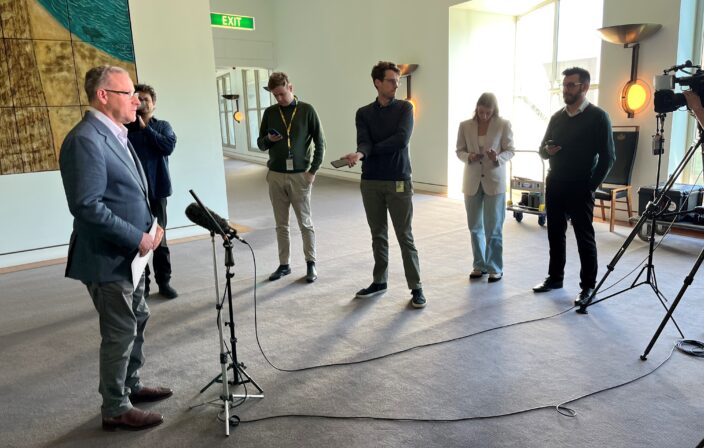Andrew McKellar interview with Haidi Stroud-Watts and Kathleen Hays, Bloomberg Daybreak Australia
30 Aug 2022
|Transcripts
Event: Andrew McKellar interview with Haidi Stroud-Watts and Kathleen Hays, Bloomberg Daybreak Australia.
Speakers: Andrew McKellar, chief executive Australian Chamber of Commerce and Industry; Haidi Stroud-Watts, host Bloomberg Daybreak Australia; Kathleen Hays, global economics and policy editor Bloomberg.
Date: 30 August 2022.
Topics: Jobs and Skills Summit; skilled migration, energy costs, port infrastructure.
E&OE
Haidi Stroud-Watts, host Bloomberg Daybreak Australia: Well Australia is holding its Jobs and Skills Summit later this week. Our next guest will be there. He runs the country’s largest business network and will be representing the interest of its 400,000 members. With us now is Andrew McKellar, who’s the CEO at the Australian Chamber of Commerce and Industry. Andrew, great to have you with us. First up, what is the priority going into this summit and what do you think really desperately needs to be addressed for the labour market right now?
Andrew McKellar, chief executive Australian Chamber of Commerce and Industry: Thank you, Haidi. Great to be with you. Look, I think we have a number of pressures facing the Australian economy at the moment. Some shorter-term pressures, and then I think there are some longer-term priorities. In the short-term, the number one issue is the labour and skills shortages that we face. We are at or beyond full employment. We need solutions and we need them quickly. In the longer-term, we’ve got to get productivity going again and be able to link wage growth back into productivity.
Haidi: We’ve actually seen a suggestion to raise the salary floor for skilled migrants coming to Australia to $90,000. We saw Singapore just launching this five-year visa for basically anyone who’s earning above $30,000 Singapore dollar a month. Do you think lower is going be better? And what does that mean for migration?
Andrew: I think what it clearly illustrates is that Australia, like many countries, we are in an intense competition for skilled labour. We’re seeing the same sort of thing. We’re seeing Canada being very proactive. We’re seeing the UK being very strong trying to get people in. They know that they’re competing for skills and now Singapore doing the same. So we really have to reduce the red tape. We have to make it much easier for business to access those skilled migrants and give them a pathway to get here, encourage them to come to Australia. Otherwise, that’s not going to happen.
Haidi: Do we need to have more enticing policies or risk missing out?
Andrew: Absolutely. No, we absolutely need to make it much more attractive. We’re in an intense global competition for talent. And that’s the only way that we are going to maintain our position.
Kathleen Hays, global economics and policy editor Bloomberg: Andrew, I was curious, because see, this makes so much sense. Who is against this? Who are you trying to convince?
Andrew: Look, I think we’re hearing from all sides that they understand the problem. So we’re hearing it from unions. I think the government now is well on board with this, Kathleen. But look, I think the key question here is what are the rules that go with it? And we’re saying we should make it easier. I think the concern we have when we talk to the trade union movement is they want to put more conditions on. And I think that would be the wrong step.
Kathleen: More broadly, because the RBA, Reserve Bank of Australia, so investors are watching wages in Australia so carefully, how much they’re going to rise, how much they’re going to push the hand of the RBA towards more rate hikes. Broadly, from your perspective, 400,000 firms that are part of your organisation, what are you hearing? What are you seeing?
Andrew: Well, look, I think undoubtedly wages in Australia have been low for a number of years. We’ve been operating in a low-inflation, low-productivity environment. We’re seeing inflation pushing up above 6 per cent now. Wages remain quite modest, between 2 and 3 per cent. It is going to increase with that market pressure. We can’t afford to chase after the inflation numbers that we’re seeing at the moment. That would be a big mistake. But look, what we have to do if we’re going to have higher wages, we’ve got to really reinvigorate productivity growth in Australia. That means we’ve got to make enterprise bargaining work again.
Haidi: The government has a responsibility, but as you say, businesses have a responsibility too to make their own investments.
Andrew: Sure.
Haidi: Is the problem also when they make their own investments and then they let go of those workers as we’ve seen across aviation?
Andrew: I think here the overall picture, we’ve got to keep that in mind, and at the moment the Australian labour market we’re at or beyond full employment. So I think there’s intense competition for labour. We’ve still got very strong demand in the economy. So I don’t think we’re at a position where we face that sort of problem of letting people go. I think we’re in the opposite situation.
Haidi: That’s a sort of, I guess some would say short- term decision that was made during the pandemic.
Andrew: Now, that’s right. And I think the amazing thing is we’ve come through that pandemic, and we haven’t incurred that same sort of damage that we’ve had in past crises. So look, we’ve got to take advantage of that now. And really what that means is we’ve got to focus on the supply -side of the economy. That’s where the focus of policy, I think, is going to have to be.
Haidi: So, beyond the skills shortage, what’s the biggest challenge and pressure for the businesses that you represent at the moment? Is it rising rates? Is it rising costs?
Andrew: Absolutely costs. Energy. Access to reliable, secure, sustainable, and affordable energy supply. We’ve seen some real difficulties with that in electricity and gas in recent months. So I think getting that investment in place, I think that’s a long-term challenge. Making sure that our infrastructure is productive at ports. So I think all of that feeds into a longer-term narrative if we’re going to get or maintain and increase the strength of the Australian economy in the next few years.
Haidi: Andrew, great to have you with us.
Andrew: Thank you.
Haidi: We appreciate your time. Andrew McKellar, CEO at the Australian Chamber of Commerce and Industry.


